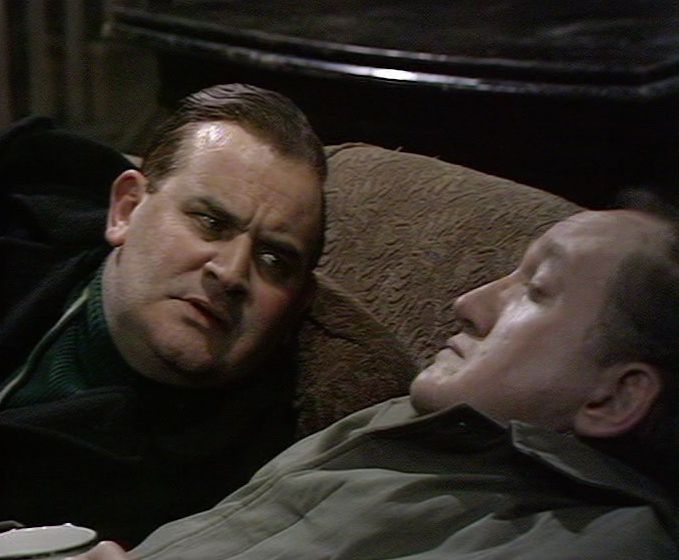
Jack Warner is in the chair for the 1964 Stars, introducing Billy Cotton, Dick Emery, Top of the Pops, Andy Stewart, Terry Scott & Hugh Lloyd, The Likely Lads, Richard Briers & Prunella Scales, Benny Hill and Kathy Kirby.
The first observation is that they’ve not exactly splashed out with the set dressings for poor old Jack, who has to present his links in the middle of a cold and deserted studio – with only an armchair, a table, some candles, a Christmas tree and a few other assorted decorations for company. Still, pro that he is, he soldiers on regardless.
After Billy Cotton and his band gets the show off to a rousing start (“wakey, wakey!”) we move onto film as Dick Emery, in various guises, is stopped in the street and asked how he/she plans to spend Christmas. It’s interesting to compare and contrast Emery with Benny Hill (who later in the show also plays a variety of characters). I’d definitely have to give Hill the edge, although Emery has his moments, especially with the man-eating Mandy. “You are awful, but I like you”.
Top of the Pops are represented by …. the Barron Knights. Well, if you can’t afford the real groups I guess they were the next best thing. They’d had their first taste of chart success in 1964 with Call up the Groups and their Stars appearance isn’t too dissimilar – parodying popular groups and hits of the day by changing the lyrics, here with a Christmas theme.
Andy Stewart heads up to the North of Scotland for a bit of a toe-tapper, which is followed by Terry Scott and Hugh Lloyd in a seasonal Hugh and I skit. As with the series, Patricia Hayes, Jack Haigh, Molly Sugden and the luvverly Jill Curzon provide strong support. There’s more than a touch of Tony Hancock in Scott’s performance, meaning that it’s easy to imagine the curmudgeon of East Cheam in a similar situation – a house full of guests at Christmas that he’d sooner weren’t there (and the presence of Pat Hayes and Hugh Lloyd are obvious links to the Lad Himself). Scott dominates proceedings as he attempts to persuade the others to take part in a parlour game. A nice segment which doesn’t outstay its welcome.
As Jack Warner says, most of the shows and performers on CNWTS were household favourites, but The Likely Lads had only started a fortnight before – meaning that someone must have quickly spotted this was a series with potential. And it’s definitely a highlight of the programme, as even this early on both Clement/La Frenais and Bolam/Bewes seemed perfectly comfortable with the characters.
Terry’s keen to head out for an evening’s liquid refreshment, pouring scorn on those who stay in. “Catch me staying in. Bowl of nuts, box of dates and Christmas Night with the Stars. No thank you!” But Bob and Terry’s evening out never gets started, thanks to an escalating argument about the name of the elephant in the Rupert annuals. Bob maintains it was Edward Trunk whilst Terry is convinced it was Edward the Elephant. So Terry fetches his annuals from the loft to settle the argument once and for all.
The desire of Bob and Terry to hark back to their childhood was a theme of the series that would only grow stronger when it returned in the seventies as Whatever Happened to the Likely Lads? This small segment demonstrates that right from the start Clement and La Frenais recognised this aspect of their characters could produce comedy gold. A pity that it’s not available on the DVD (like many of the other Stars segments sadly) but then 2E did leave a whole episode off the original release …..
Billy Cotton introduces Ralph Reader’s Gang Show, which is followed by Benny Hill. It’s not surprising that the picture we have today of Benny Hill is from his years at Thames. Not only because those shows were incredibly successful worldwide, but they’re also the ones that are readily available on DVD. His 1960’s BBC shows are less accessible (although there is a R1 compilation). Maybe one day all that remains will be released on DVD, I hope so – since they contain some strong material which gives the lie to the oft repeated claim that Hill was a fairly low-brow performer.
His Stars segment, The Lonely One, is a good case in point. Shot on film, Hill not only plays the central character in the short mockumentary – a juvenile delinquent called Willy Treader – but all of the other parts as well. It’s very nicely done and Hill’s creations (possibly because he wrote the script too) feel more like real people than Dick Emery’s more broad characters did.
Richard Briers and Prunella Scales are up next in Marriage Lines. It’s cosy and twee, but Briers and Scales make it just about worthwhile. George and Kate Starling are expecting their first child which is reflected in their presents to each other – Kate gives him a sleeping bag (in case the baby gets too noisy, he can move to another room) whilst George gives her a maternity smock (seemingly not realising that she’s due to give birth in a month).
Although billed second, Kathy Kirby appears last to sing Have Yourself a Merry Little Chirstmas. It’s a fairly short and low-key ending, but overall the 1964 Stars is a consistently strong show with very little filler.











